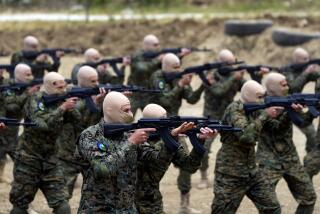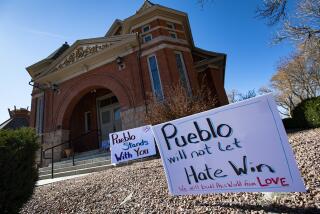Muslims Called to Jihad
- Share via
The U.S.-led invasion of Iraq has blurred the lines between mainstream, liberal and radical politics in the world of Islam and has dissipated much of the empathy felt by Arabs toward the U.S. in the aftermath of the 9/11 attacks.
Perhaps most alarming, U.S. policy toward Iraq has alienated many of the important moderate voices, both secular and religious, which until now had been unwilling to join with militant anti-American forces.
Cairo’s Al Azhar University -- the most-respected institution of religious learning in the Muslim world -- has issued a fatwa, or religious edict, advising “all Muslims in the world to make ‘jihad’ against invading American forces.” The statement warned that Islam itself is the direct target of the “new crusaders’ invasion,” aimed at humiliating and subjugating Arabs and controlling their resources.
Given its historical and religious symbolism and weight, Al Azhar’s ruling is likely to resonate with the faithful.
Prominent Muslim clerics and political leaders have echoed Al Azhar. Mohammed Sayed Tantawi, a reformist who, as the grand sheik of Al Azhar University, was one of the first clerics to condemn the Sept. 11 attacks and to dismiss Osama bin Laden’s jihadi credentials as fraudulent, ruled that attempts to resist an American attack are a “binding Islamic duty,” and he asked Arab leaders to block any aggression against Iraq. Maligned previously as a pro-Western reformer, despite his support for Palestinian suicide bombers, Tantawi’s new stance shows the extent of the realignment.
Moderates and radicals now appear to be united and determined to oppose the American war. The leader of the Muslim Brotherhood in Egypt -- a mainstream Islamist organization with membership numbers in the millions -- called on his followers everywhere to join in jihad in defense of Iraq. The Muslim Brotherhood has not been considered militant since the 1970s, when it disavowed violence and agreed to play by the rules of the political game.
Hezbollah leader Sheik Hassan Nasrallah, whose organization had been moving away from militancy in recent years, was even more explicit: Americans “will not be met in this region with roses, flowers and perfumes. They will be met with arms, martyrdom and rifles.”
The big questions now are: How will the new calls to arms be translated in operational terms and will the battlefield be limited to the Iraqi theater?
Bin Laden must be laughing in either his grave or cave. His strategic goal was to mobilize Muslims worldwide to heed his call for jihad. But his apocalyptic nightmare initially fell on deaf ears. Then, leading Muslim clerics cautioned young men not to be swayed by the calls for jihad from fringe groups like Al Qaeda and said that only legitimate institutions and accredited scholars should be heeded. Yet what was unthinkable 18 months ago has happened. The U.S. has alienated those in the Islamic community who were its best hope. The challenge now is to limit the damage.
*
Fawaz A. Gerges is a professor of Middle East and international affairs at Sarah Lawrence College and author of the forthcoming “The Islamists and the West” (Cambridge University Press).
More to Read
Sign up for Essential California
The most important California stories and recommendations in your inbox every morning.
You may occasionally receive promotional content from the Los Angeles Times.












